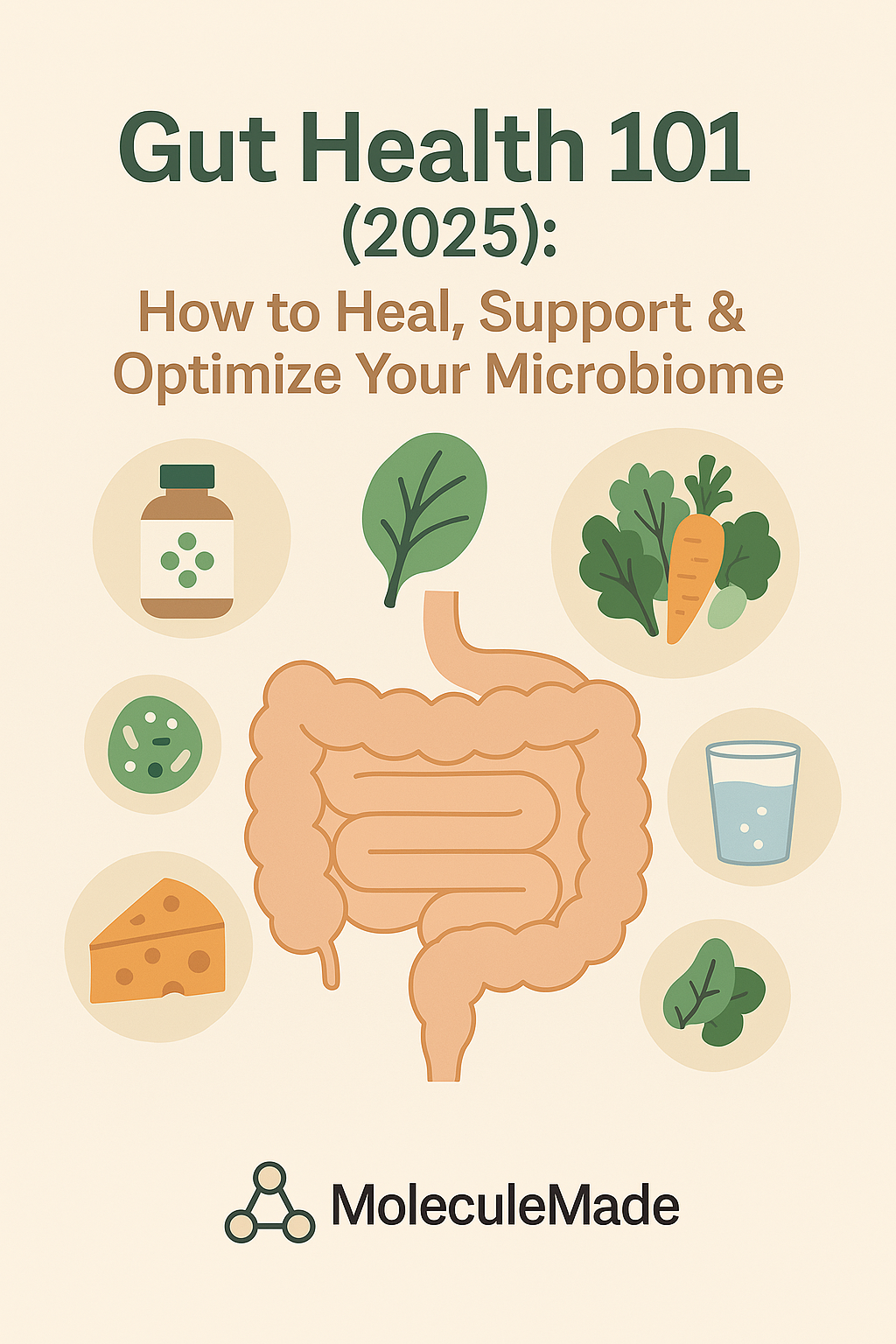Gut Health 101 (2025): How to Heal, Support & Optimize Your Microbiome
Introduction
“All disease begins in the gut.” – Hippocrates
Your gut does way more than digest food. It’s home to trillions of microbes that influence your mood, immune system, skin, and even brain function. When your gut is out of balance, everything else can feel off.
In today’s world, gut issues are on the rise — bloating, IBS, fatigue, skin flares, and even brain fog can often be traced back to what’s happening in your digestive system.
The good news? With the right approach, you can start healing your gut, restoring balance, and optimizing your overall health — naturally.
In this guide, we’ll break down how the gut works, what causes dysfunction, and the best science-backed ways to support it. Whether you’re dealing with chronic issues or just want to feel better every day, this is your clear, modern path to gut health.
What Is Gut Health (And Why It Matters)
Your gut — specifically your intestines — is home to over 100 trillion bacteria, fungi, and other microorganisms. This community is called the gut microbiome.
It influences:
- Digestion and nutrient absorption
- Immune system regulation
- Inflammation and autoimmune triggers
- Mental health and the gut-brain axis
- Hormone and skin health
A healthy gut is diverse, balanced, and resilient. When the microbiome is disrupted — from poor diet, antibiotics, stress, or infection — it can lead to symptoms across the body.
Signs Your Gut May Be Out of Balance
- Frequent bloating or indigestion
- Irregular bowel movements (constipation or diarrhea)
- Food sensitivities or intolerances
- Fatigue, brain fog, or mood swings
- Skin breakouts or eczema
- Autoimmune symptoms or joint pain
These are often early red flags — your gut’s way of saying “something’s off.”
What Causes Poor Gut Health?
Several factors can damage your gut lining or disrupt your microbiome:
- Highly processed diets low in fiber and high in sugar
- Excessive alcohol or NSAID use (like ibuprofen)
- Chronic stress and sleep deprivation
- Antibiotics or medications that wipe out good bacteria
- Environmental toxins and heavy metals
- Dysbiosis – microbial imbalance (too much bad bacteria or yeast)
Over time, this can lead to inflammation, leaky gut, and immune system confusion.
Understanding Leaky Gut (Intestinal Permeability)
“Leaky gut” describes a condition where the tight junctions in your intestinal wall become loose, allowing food particles, toxins, or bacteria to leak into your bloodstream.
This can trigger:
- Inflammation
- Autoimmune flare-ups
- Brain fog and fatigue
- Food sensitivities
While still debated in mainstream medicine, many functional practitioners recognize leaky gut as a precursor to broader health issues.
The Gut-Brain Connection
Here’s where it gets even more interesting: your gut and brain are in constant communication through the gut-brain axis.
- About 90% of serotonin (your “happy hormone”) is made in the gut
- Gut bacteria produce neurotransmitters like GABA and dopamine
- Inflammation in the gut can trigger anxiety or depression
This is why gut health is so closely tied to mental clarity, mood stability, and emotional resilience.
Top Foods for Gut Health
Whole, plant-rich, and fermented foods are your gut’s best friend:
- Prebiotics: garlic, onions, leeks, asparagus, bananas
- Probiotics: kefir, yogurt, sauerkraut, kimchi, miso
- Polyphenols: berries, olive oil, green tea, dark chocolate
- Fermented fibers: oats, apples, flaxseed
- Bone broth & collagen: for gut lining support
Try to eat at least 30 different plant foods a week to promote microbiome diversity.
Gut-Healing Supplements (Science-Backed)
Not all supplements are equal — here are the ones worth considering:
- Probiotics
Choose multi-strain blends with clinically tested bacteria (like L. rhamnosus or B. longum). Rotate every few months. - Prebiotics
Feed your good bacteria. Look for inulin, FOS, or partially hydrolyzed guar gum. - L-glutamine
An amino acid that supports gut lining repair. Especially useful during gut healing protocols. - Digestive enzymes
Help break down food more efficiently, reducing gas and bloating. - Zinc carnosine
Supports mucosal integrity and helps calm inflammation. - Saccharomyces boulardii
A probiotic yeast useful for travel, diarrhea, or antibiotic recovery.
Always introduce supplements gradually, and speak to a practitioner for tailored advice.
The 4R Protocol for Gut Healing
Popular in functional medicine, this framework helps reset gut health in stages:
- Remove irritants (processed foods, gluten, excess sugar, alcohol)
- Replace with digestive enzymes and gut-friendly nutrients
- Reinoculate with probiotics and prebiotic fibers
- Repair with glutamine, zinc, and anti-inflammatories
It’s not a one-size-fits-all, but it offers structure if you’re starting from scratch.
Lifestyle Habits That Support Gut Health
- Sleep: Aim for 7–9 hours — sleep disruption weakens your gut barrier
- Stress: Chronic stress alters your gut bacteria and reduces enzyme output
- Movement: Gentle exercise like walking boosts gut motility
- Hydration: Keeps your digestion moving and your microbiome happy
- Slow eating: Chewing thoroughly reduces bloating and improves absorption
These are the unsexy but powerful habits that make supplements work better.
Conclusion: Your Gut is Your Foundation
Your gut is central to how you feel, think, and function. When it’s inflamed, everything suffers. But when it’s supported? Energy returns. Brain fog lifts. Even your mood improves.
Gut health isn’t a quick fix — it’s a daily relationship. Start small. Eat more plants. Choose targeted supplements. Manage stress.
And remember: what you do today shapes your microbiome tomorrow.

